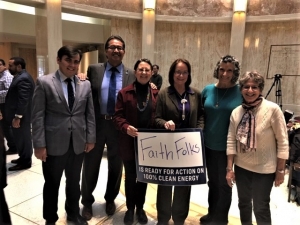NM Interfaith Power & Light Identifies State Legislative Priorities
 As we move into the legislative session in New Mexico NM IPL will be following a handful of initiatives. In working with these concerns we offer the voice of faith from an ethical and justice perspective rooted in the basic foundation of all religious traditions—to Love and care for neighbor and sacred creation. This year growing concern for our climate, the pandemic, the urban rural divide and racial and economic justice have influenced some of the initiatives that will be followed. We invite your engagement in the 60 day session as you can and will try to keep you updated.
As we move into the legislative session in New Mexico NM IPL will be following a handful of initiatives. In working with these concerns we offer the voice of faith from an ethical and justice perspective rooted in the basic foundation of all religious traditions—to Love and care for neighbor and sacred creation. This year growing concern for our climate, the pandemic, the urban rural divide and racial and economic justice have influenced some of the initiatives that will be followed. We invite your engagement in the 60 day session as you can and will try to keep you updated.
Because of the ongoing COVID-19 pandemic, much of the session will be remote, which creates challenges for citizens to communicate with their elected officials. Still, we move forward with the environmental initiatives
Many important initiatives have been introduced or will be introduced in either the Senate or the State House of Representatives or both.
On the budget front, we support an increase in funding for environmental protection, inspection, enforcement and transparency via increased funding to he New Mexico Energy, Minerals and Natural Resources Department (EMNRD) and Oil Conservation Division.
NM-IPL is also strongly behind the creation of a Green Amendment to the New Mexico State Constitution, which would give all residents of the state a right to clean air, water, and land. In the Senate, the three main sponsors are Sens. Antoinette Sedillo Lopez, Bill Soules and Mimi Stewart. The House sponsor is Rep. Joanne Ferrary.
NM-IPL also supports a measure introduced by Senate Majority Leader Peter Wirth to strengthen language in the Air Quality Act and the Hazardous Waste Act. Under the measure, the state would be allowed to enact regulations to create protections than those found in federal law.
We are strongly behind the most recent attempt to enact The Community Solar Act. The act authorizes cities, counties, pueblos, tribes, and solar developers, as well as NGOs supporting low and moderate income individuals, to develop community solar facilities using solar credits provided to individual community members. The measure, HB106, is sponsored by Rep. Patricia Roybal Caballero, Sen. Liz Stefanics and Sen. Linda Lopez.
NM-IPL also supports amendments to the Produced Water Act to ensure the safe handling and disposal of toxic waste, to protect public health, and to preserve scarce freshwater. The measure, filed by Sen. Antoinette Sedillo Lopez, would require oil and gas operators to use produced water instead of freshwater for fracking and provide penalties for spills, using fines to develop shared public information and data. Additionally, the measure requires two state agencies to take additional steps to protect the public. The New Mexico Environment Department would be required to regulate pollution from produced water and the Oil Conservation Division would need to regulate the safe management and disposal of oil and gas waste.
A couple of other initiatives are in the works in the House, including the Just Transition measure proposed by Rep. Angelica Rubio. The measure, which could merge with the Climate Resiliency Bill carried by Rep. Melanie Stansbury, calls for a study on how to transition from an economy and a state budget that is reliant on gas and oil revenues to one that is sustainable.
Another proposed initiative would offer energy assistance to families affected in a significant manner by the COVID-19 crisis. The COVID-19 Crisis Energy Burden and Affordability Relief Act creates protections after the public health emergency is over. Disconnections would be prohibited on low-income and otherwise needed customers who are in utility arrears. Utilities would be directed to seek available federal funds, create payment plans and defer some payments.
Other measures worth watching are a proposal to restrict on the use of neonicotinoid class pesticides, which are highly toxic to bees, which are key to food production
Another important measure is the Food and Agriculture Omnibus bill, which has the goal of addressing food insecureity in our state in a comprehensive and long-term manner. The initiative brings together proposals 0put forth by broad range of participants, including nutrition, agriculture, nutrition, anti-poverty advocates, government representatives and others working together to reduce hunger in our state while supporting the needs of small farmers and rural communities.
We will offer regular updates on important developments related to all of these initiatives. Stay tuned.
